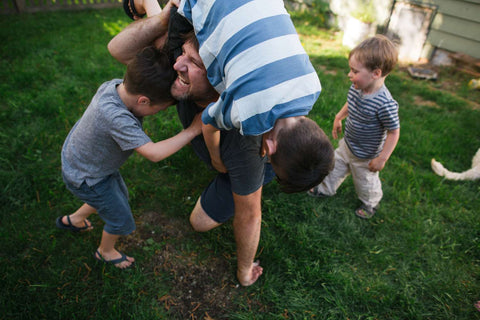The Important Role of the Modern Day Father
In today's rapidly changing society, the role of fathers has evolved significantly from traditional expectations. Gone are the days when fathers were solely seen as providers and disciplinarians. The modern-day father plays a crucial role in the family dynamic, contributing to their children's emotional, intellectual, and physical development in diverse ways. He can be single or married, externally employed or stay-at-home, gay or straight, an adoptive or step-parent, and a more than capable caregiver to children facing physical or psychological challenges. Psychological research across families from all ethnic backgrounds suggests that fathers' affection and increased family involvement help promote children's social and emotional development. In this article, we'll highlight the dad and delve into the multifaceted aspects of his vital role.
What has brought this change? Some history and facts

Picture this: it's the 1950s, and Dad's idea of parenting involves reading the Sunday newspaper while Mom handles everything else. Fast forward to today, and Dad's got a whole new role. He's the diaper-changing dynamo, the bedtime story master, and the ultimate snack-time boss. These are some key historical developments and statistics that have contributed to this transformation:
Women's Liberation Movement
The Women's Liberation Movement, which gained momentum in the mid-20th century, challenged traditional gender roles and advocated for women's rights and equality. As more women entered the workforce and pursued higher education, the division of labor within households began to change. This shift prompted men to take on more active roles in caregiving and household responsibilities.
Economic Changes
Economic trends, such as the rise of dual-income households and the increasing cost of living, have reshaped family dynamics. With both parents often working full-time jobs to support their families financially, a growing need for fathers to share caregiving duties and contribute to household chores has been growing. In more recent decades, the changing economic role of women has significantly impacted the role of fathers. Between 1948 and 2001, the percentage of working-age women employed or looking for work nearly doubled, from less than 33 percent to more than 60 percent. Their increased financial power made paternal financial support less necessary for some families. In tandem with the growing autonomy of women, related trends such as declining fertility, increasing rates of divorce and remarriage, and childbirth outside of marriage have resulted in a transition from traditional to multiple undefined roles for many fathers. Today’s fathers have started to take on roles vastly different from those of fathers of previous generations.
Fun Fact:
According to the Pew Research Center, the percentage of dual-income households in the United States increased from 25% in 1960 to 66% in 2019.
Changing Attitudes Towards Fatherhood
Societal attitudes towards fatherhood have shifted over time, with greater emphasis placed on the importance of paternal involvement in children's lives. Research conducted by the Pew Research Center indicates that most Americans believe fathers today do a better job as parents than previous generations. This change in perception has encouraged fathers to take on more active roles in parenting and caregiving.
Legal and Policy Changes:
Legal and policy changes, such as implementing parental leave policies and recognizing fathers' rights, have also contributed to the redefinition of fatherhood. A study by Oxford University researchers has shown that Fathers who want to be more involved with their newborn children feel held back by a lack of support from health staff, government, and society. In many countries, parental leave policies now offer fathers the opportunity to take time off work to bond with their newborns and support their partners during the postpartum period. These policies not only promote gender equality but also encourage fathers to be more involved in childcare from the outset.
Research & Technology:
Advancements in psychology and child development research have highlighted the importance of father-child relationships in children's emotional and cognitive development. Studies have shown that children who have involved and supportive fathers tend to have better social skills, academic performance, and emotional well-being. This growing body of research has underscored the significance of fathers' contributions to their children's lives, motivating men to take on more active parenting roles.
Technology has also revolutionized modern parenthood, offering new tools and resources to support parents in their journey. From online parenting forums and apps that track developmental milestones to video calls that enable parents to stay connected while away from home, technology has transformed how parents engage with their children and seek support from their communities.
Exploring Diverse Roles of Fatherhood
Fatherhood comes in all shapes and sizes, each with its unique challenges, joys, and triumphs. From non-residential fathers to stay-at-home dads, let's take a peek into the colorful tapestry of fatherhood and celebrate the diverse roles these men play in their children's lives.
Non-Residential Fathers
These dads may not live under the same roof as their children, but that doesn't diminish their love for them. Non-resident fathers often struggle to maintain a strong bond with their children despite physical distance. Whether through regular visits, phone calls, or virtual chats, these dads find creative ways to stay connected and actively participate in their children's lives. Research (1) on the role of fathers suggests that the influence of a father's love on children's development is as significant as the influence of a mother's love. Fatherly love helps children develop a sense of their place in the world, which helps their social, emotional, and cognitive development and functioning. Moreover, children who receive more love from their fathers are less likely to struggle with behavioral or substance abuse problems.

Sixty percent of American men today have at least one biological child. (2)
Divorced and Step-Fathers
Divorce can be a rocky road, but for many dads, it's just a plot twist in their fatherhood journey. Divorced and step-fathers bravely navigate the complexities of blended families, forging new relationships with stepchildren while continuing to support their biological offspring. From attending soccer games to helping with homework, these dads prove that love knows no bounds, even in the face of family upheaval.
Gay Fathers
Love is love, and that's especially true for gay fathers who proudly defy societal norms and embrace parenthood with open arms. Whether through adoption, surrogacy, or co-parenting arrangements, gay fathers create loving and nurturing environments for their children, filled with acceptance and understanding. These "two-father households" teach their children the value of diversity and resilience, showing them that families come in all shapes, sizes, and colors.
Stay-at-Home Fathers
Who says moms have a monopoly on homemaking? The number of fathers who do not work outside the home has risen markedly in recent years. According to the Pew Research Center, an estimated 2.1 million fathers were stay-at-home dads in 2021—up 8% since 1989.
Roughly a quarter of these stay-at-home fathers (23%) report that they are home mainly because they cannot find a job. Nearly as many (21%) say they are home mainly to care for their home or family. This represents a fourfold increase from 1989, when only 5% of stay-at-home fathers said they were home primarily to care for family.
Fun Fact: 
About three-quarters of the 72 million fathers in the United States have more than one biological child. (3)
Stay-at-home fathers proudly don the apron and take on the role of primary caregiver, proving that nurturing knows no gender. Their dedication and love know no bounds as they redefine traditional gender roles and pave the way for a more equitable future.
Role Model for Behavior

In the grand theater of life, dads often take center stage as the unsung heroes, quietly shaping the character and values of their children through their actions, attitudes, and principles. As role models for behavior, dads don't need capes or superpowers to leave a lasting impact. Their everyday deeds speak volumes. Here are a few examples of why dads are the ultimate role models for behavior and invaluable lessons:
Teaching Responsibility and Accountability
Life isn't all sunshine and rainbows; dads know this too well. Through their actions, dads teach their children the importance of responsibility and accountability. Whether completing chores around the house, honoring commitments, or owning up to mistakes, dads instill a sense of duty and integrity in their children. By holding themselves accountable for their actions, dads show their children that character is built on honesty and reliability.
Fostering Resilience and Perseverance
In the game of life, setbacks are inevitable, but dads are there to teach their children the power of resilience and perseverance. Whether it's cheering them on from the sidelines during a tough soccer match or offering words of encouragement after a disappointing defeat, dads instill in their children the belief that failure is not the end but merely a stepping stone to success. Through their unwavering support and guidance, dads empower their children to dust themselves off and keep moving forward, no matter their obstacles.
Encouraging Empathy and Compassion
In a world that often seems divided, dads are beacons of empathy and compassion, teaching their children the importance of kindness and understanding. Whether it's lending a helping hand to those in need or simply offering a listening ear to a friend in distress, dads show their children that small acts of kindness can make a big difference in the lives of others. By leading with empathy and compassion, dads instill in their children a sense of empathy and compassion, fostering a more caring and inclusive society.
Collaborative Management of Household Responsibilities
The days of "mom does the cooking, dad takes out the trash" are behind us. Modern fathers roll up their sleeves and dive into the trenches of household chores, sharing the load with their partners, from cooking dinner to doing laundry, grocery shopping, and ordering baby formula for their little one.
At Organic Formula Shop, we witness firsthand the evidence of fathers' active involvement in raising their families through the significant number of dads who order our organic formula for their little ones. Every day, our customer support team chats with dads discussing which formula to choose, providing tips and tricks for feeding babies, and answering questions about delivery times. Approximately 40% of our formula orders come from dads, showcasing their commitment to their children's well-being and their proactive role in parenting. This trend highlights the evolving landscape of fatherhood, where dads are supportive partners and hands-on caregivers, contributing to their children's nurturing and healthy development!
Rough and tumble

We all understand the importance of "rough and tumble" play. It's a high-energy activity where children are tossed into the air, spun around the room like airplanes, and playfully tickled, accompanied by laughter and giggles. Interestingly, this type of play is predominantly facilitated by dads. Beyond being incredibly enjoyable, it serves a critical role in bonding and child development. Engaging in rough-and-tumble play triggers bonding hormones in all participants. Moreover, its dynamic and challenging nature helps children develop essential skills such as reciprocity, empathy, risk assessment, and overcoming challenges. A unique neurochemical reward associated with playing with dads may not be present when playing with moms, contributing to the preference for father-child playtime.
Providing Support and Mutual Respect
At the heart of the modern family is a partnership built on equality and mutual respect. Modern dads stand by their spouses through thick and thin, offering a shoulder to lean on during challenging times and celebrating victories. Whether juggling work deadlines while nursing a sick child or navigating the ups and downs of parenthood together, fathers provide unwavering support, reinforcing the bond of partnership and love.
Conclusion
In today's rapidly evolving society, the role of fathers has undergone a remarkable transformation, departing from traditional expectations to embrace a more diverse and dynamic approach to parenthood. No longer confined to the roles of sole provider or distant disciplinarian, the modern-day father has emerged as an integral part of the family dynamic, actively contributing to his children's emotional, intellectual, and physical development. Many factors, including shifts in societal attitudes, economic changes, and advancements in research and technology, have driven this significant change.
However, it's important to acknowledge that the evolution of fatherhood is not solely the result of fathers' efforts alone. Behind every successful father is a supportive partner, a wife or husband, who plays an equally crucial role in shaping the family dynamic. It takes two to tango, and the partnership between parents is essential in navigating the complexities of modern parenthood. Together, they share the joys and challenges of raising children, forging bonds that transcend traditional gender roles and stereotypes.
So here's to all the dads (and their partners)! May your partnership inspire and uplift families for generations to come, with humor and positivity to light the way!
Contact
Regardless of whether you're a dad or a mom ;) Please contact our dedicated customer support team for expert formula advice and guidance tailored to your baby's needs. They have earned hundreds of 5-star reviews from our customers, helping you to provide the best nutrition for your little one. Contact us here or shoot us an email at support@organicformulashop.com. We're here to help!
Sources:
(1) APA (2004). Briefing sheet: An overview of the psychological literature on the effects of divorce on children. Washington, D.C.: Author. Retrieved June 15, 2009
(2) L. M. Monte, “Fertility Research Brief,” Current Population Reports, P70BR-147, March 2017.
(3) L. M. Monte, “Fertility Research Brief,” Current Population Reports, P70BR-147, March 2017.




